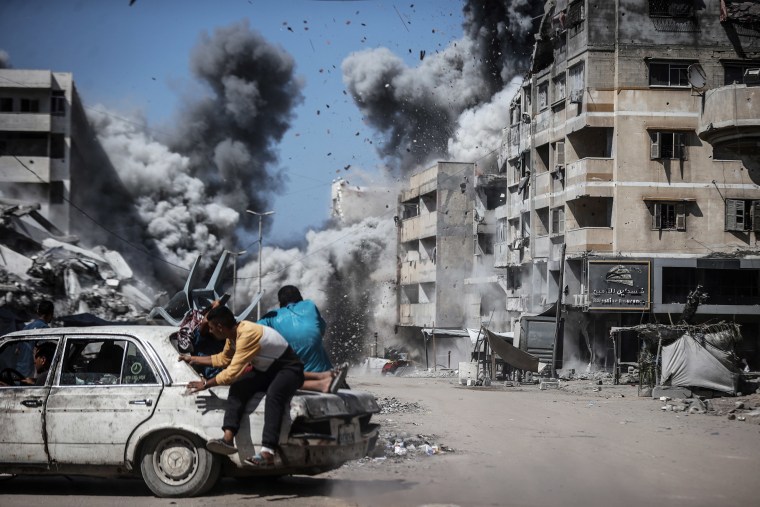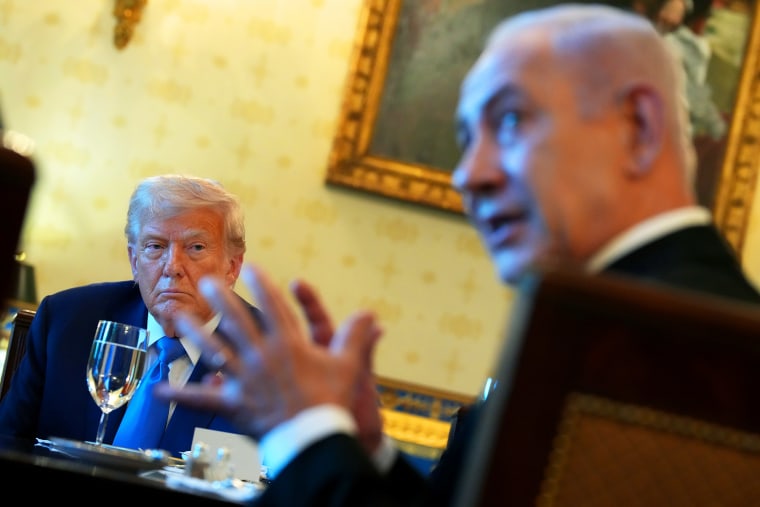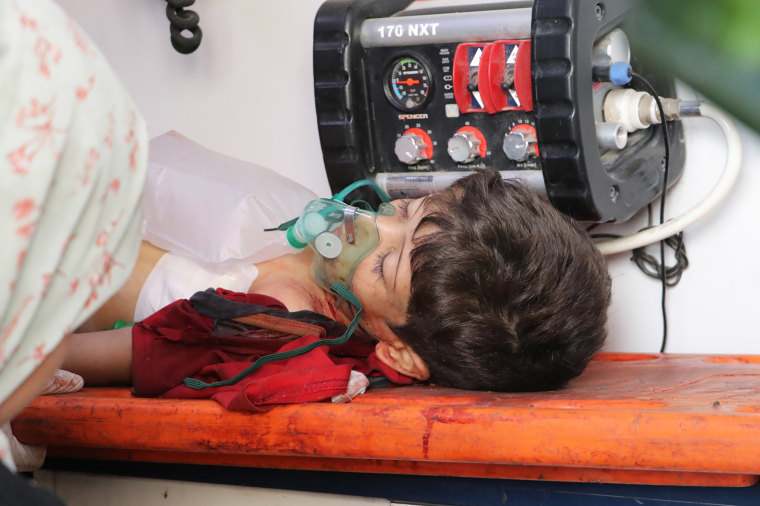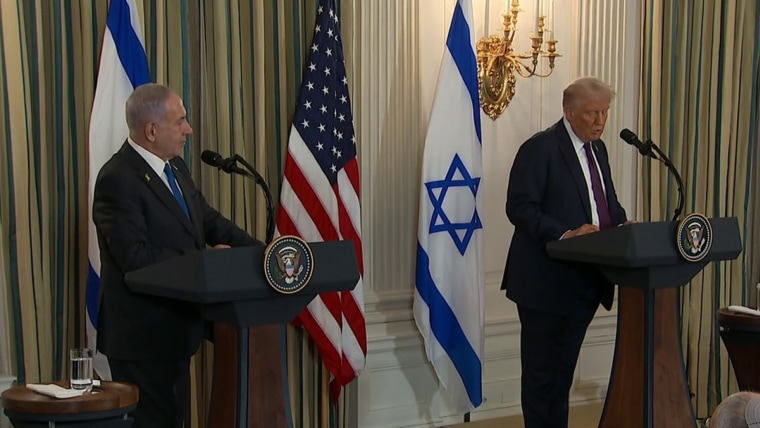President Donald Trump touted his plan for a peace deal in Gaza after his meeting with Israeli Prime Minister Benjamin Netanyahu at the White House on Monday but said Israel would have the "full backing" of the United States to destroy Hamas if the plan falls through.
“I think we are very close,” Trump said at the White House. But if Hamas fails to agree to the plan, he said, Israel could continue its campaign. "Bibi, you'd have our full backing to do what you would have to do," he added.
The 20-point U.S. plan to end the war begins with an immediate ceasefire and proposes that Hamas release all of the hostages within 72 hours in exchange for a phased withdrawal of Israeli troops with the aim of a permanent ceasefire, according to the White House.
Hamas members who commit to peace and lay down their arms would be given amnesty, offering them a pathway to rejoin civilian life, while those who wish to leave Gaza would be offered safe passage, the White House said.
Full humanitarian aid would resume, administered by the United Nations and its organizations, the Red Crescent and other groups. According to the plan, Gaza would be redeveloped "for the benefit of the people of Gaza."
“I hope that we’re going to have a deal for peace, and if Hamas rejects the deal, which is always possible, they’re the only one left,” Trump said. “Everyone else has accepted it.”
Trump had sounded optimistic in an exclusive interview with NBC News on Sunday ahead of the crucial talks.
“We’re doing very well. It looks like there is a really good chance for peace in the Middle East,” he said. “Everybody is on board. Everybody.”
White House special envoy Steve Witkoff and Trump’s son-in-law Jared Kushner have been closely involved in the process, along with Vice President JD Vance and White House chief of staff Susie Wiles, Trump told reporters.
He also said he would chair a temporary transitional oversight body for Gaza, known as the Board of Peace, alongside former British Prime Minister Tony Blair and other high-profile participants.
The Palestinian Authority said in a statement on Monday that it welcomed the plan and "stresses the importance of partnership with the United States in achieving peace in the region," according to the Wafa news agency.
Israel has faced mounting global isolation and outrage, with a host of Western powers embracing Palestinian statehood in defiance of the United States and its close ally while Israeli forces push ahead with a deadly assault on famine-stricken Gaza City.

Netanyahu's government has also faced growing pressure from Trump over Israel's actions in the Middle East, with Trump warning he would not allow the country to annex the already occupied West Bank and expressing rare public frustration over the attack targeting Hamas officials in U.S. ally Qatar.
That strike, on senior leaders gathering to discuss a U.S. peace proposal in the capital of a crucial mediator, had appeared to derail negotiations. And Netanyahu vowed to "finish the job" in Gaza in his speech at the United Nations on Friday, when dozens of delegates walked out in protest.
Trump, in remarks Monday, reiterated his complaints over incidents at the U.N. General Assembly in New York last week, which included a defective teleprompter and what he characterized as world leaders’ “foolishly” recognizing a Palestinian state.
On a call Monday with Trump and Qatari Prime Minister Mohammed bin Abdulrahman bin Jassim Al Thani, Netanyahu expressed his “deep regret” that Israel’s strike in Qatar targeting Hamas leaders during negotiations killed a Qatari serviceman, according to a White House readout.
Netanyahu also said Israel would not repeat its attack on Qatar.
Still, Trump sounded optimistic Sunday about the possibility of a truce, despite past efforts’ repeatedly having fallen short.
“We have a real chance for GREATNESS IN THE MIDDLE EAST," he said on Truth Social. "ALL ARE ON BOARD FOR SOMETHING SPECIAL, FIRST TIME EVER. WE WILL GET IT DONE."
Trump presented his peace plan to Arab nations last week at a meeting on the sidelines of the annual U.N. General Assembly.
The sources who spoke with NBC News said it had been largely well-received, though they were unaware whether Hamas had seen the plan and said it was likely to evolve through negotiations.
The timeline for the Israel Defense Forces’ complete withdrawal from Gaza under the U.S. proposal was not specified. The sources said it would be tied to standing up a stabilization force of troops from the surrounding Arab states who would provide security for the strip.
In the interim, Gaza would be governed in two tiers, with the international body overseeing a Palestinian committee until the Palestinian Authority has implemented a slate of reforms and could resume control of Gaza "safely."
A reform program, initially outlined in the Trump administration's peace plan in 2020, calls for developing welfare programs and providing services to Palestinians "that are not based upon the commission of terrorist acts." Saudi Arabia and France have also put forward possible reforms.
The U.S. plan would require that Hamas play no role in Gaza’s governance. It also says there would be no forced displacement of Palestinians from Gaza, while the U.N. would administer humanitarian aid, with the role of the Gaza Humanitarian Foundation not immediately clear.
White House press secretary Karoline Leavitt suggested to Fox News early Monday that under the deal "both sides" might "have to give up a little bit and might leave the table a little bit unhappy."

“I think there is a good chance that the American administration really wants to see the end of the war and will probably use some of its levers of influence over Netanyahu,” Yossi Mekelberg, a senior consulting fellow with the Middle East and North Africa Program at the U.K think tank Chatham House, said in a phone interview.
But, he said, “you cant have a ceasefire in the presence of one side,” adding: “It’s a big marriage, and you need both sides to be present, so you need Hamas to agree, but Hamas is not in a very strong position right now.”
Hamas has said it would release the remaining hostages held in Gaza only in exchange for a lasting ceasefire and Israel's withdrawal from the Palestinian enclave.

At least 48 hostages are believed to remain in Gaza, only 20 of whom are believed to be alive.
On Sunday, Hamas’ military wing, the Qassam Brigades, said it had lost contact with two of the prisoners being held in Gaza because of Israeli operations.
The Hostages and Missing Families Forum, which represents the families of hostages, said in a statement that the families of the captives named by Hamas were working with authorities to review the group's claims.
The group also said Sunday it had not received any new peace proposal since negotiations were suspended after the Israeli attack on its negotiating team in Doha.
Around 250 people were taken hostage in the Hamas-led attacks on Oct. 7, 2023, in which 1,200 people were also killed, marking a major escalation in a decadeslong conflict.
Since then, more than 66,000 people have been killed in Gaza under Israel’s assault, including thousands of children, while much of the enclave has been destroyed.




